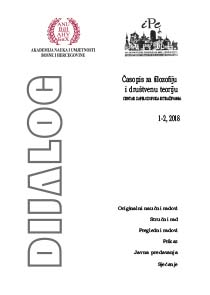Dejtonski ustav – temelji, ograničenja, mogućnosti
Dayton Constitution – Foundations, Limitations, Opportunities
Author(s): Edin RizvanovićSubject(s): Constitutional Law
Published by: Akademija Nauka i Umjetnosti Bosne i Hercegovine
Keywords: Dayton solutions; legal principles; fair competition; integration process; institutional strengthening;
Summary/Abstract: Bosnia and Herzegovina has strong foundations of statehood and a clear line of state and legal continuity, which, when it comes to the last century, refers to the ZAVNOBiH and the Dayton Peace Agreement. In both cases, the foundations are made from the struggle for freedom, with enormous human victims. The peace solutions viewed from today’s angle, in addition to those who, due to their provenance, are considered to be a logical outcome, offer a different picture than the one presented in practice. In support of the mentioned are terminological terms used then, such as: competence, ethics, recalling the UN Charter and international law, principles – acting in good faith, prohibition of discrimination, reciprocity. The regulations that followed are not on the trail of Dayton principles and legal standards. The aforementioned is necessary to contextualize with the process of transformation of ownership (social to pri¬vate – privatization) which is not followed by the process of restitution. Normative dynamics basically reflects stagnation, turning into its own con¬trary – statics, which prevents the realization of the fundamental values of law – functionality, justice and legal certainty. The best example are the Competi¬tion Law and the Election Law. Without fair competition, there is no economic and social progress. This suggests the need to amend the Competition Law, es¬pecially in the part concerning decision-making in the Competition Council, as well as the electoral regulations, inter alia, with regard to: compensatory man¬dates, holders of electoral mandates, budgetary financing and the consumption of double election law, which represents the condition for election legitimacy, fair political competition, and thus the democratization of the political scene in BiH. Future corrections of the law must respect the teleological segment, in which the common interest will inevitably be incorporated. Removing ex¬isting restrictions will enable a more stable course, and gradual realization of economic and social goals, i.e. realization of functions of the state: normative, economic and social. Suggestions (possibilities) for improving the situation: - Business system: increase incentives for small and medium-sized enter¬prises; amend bankruptcy regulations and make them more functional; increase the functionality of the Law on the state aid system through a higher percentage of allocation of public funds, priority for research and development; to establish guarantee funds and commercial courts in the Federation of BiH. - Fiscal system: to establish a different model of distribution of public revenues; strengthen the system of direct taxation; abolish excise taxes on non-alcoholic beverages. - Monetary system: strengthen the position of the Central Bank; use the potential of the Development Bank. - Integration process: to promote the acquis communautaire, through more intensive implementation of the Stabilization and Association Agreement, in particular its institutional part. In addition, it is necessary: - Institutional strengthening: more consistent implementation of the Om¬budsman regulations; by annuling the legal possibility of excluding in¬dividuals from responsibility. - Address the issue of fragmented competencies in higher education by applying the European principle of subsidiarity, as well as by introduc¬ing uniform standards and evaluation criteria.
Journal: Dijalog - Časopis za filozofiju i društvenu teoriju
- Issue Year: 2018
- Issue No: 01+02
- Page Range: 83-104
- Page Count: 22
- Language: Bosnian

